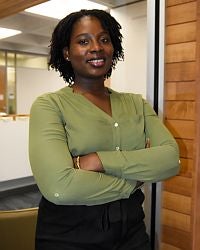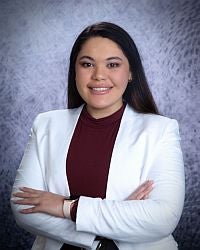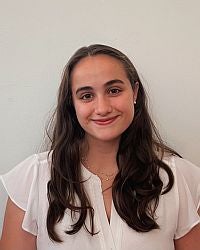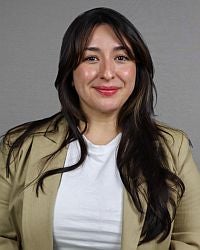The Health Justice Scholars Program supports the development of Pitt Public Health scholars who have interests and/or projects in health equity and justice. This includes, but is not limited to, health equity research, policy, and practice in areas such as:
- Chronic disease
- Violence prevention
- Maternal and infant health
- Mental health
- Interventions focused on Black, Latinx, and communities of color
- Program Details
-
All current Pitt Public Health graduate students are eligible to apply and the 2023 application deadline is September 18.
Scholars have access to professional development and training opportunities with their peers and CHE-affiliated faculty and experts.
Scholars engage in monthly meetings to network with other Health Justice Scholars and CHE faculty.
Each scholar will receive a maximum stipend of $1000 for the year with an average time commitment of 2-4 hours per week.
Meet the 2023-24 Health Justice Scholars
- Ramatu Abdul Hamid Alhassan, MPH Epidemiology
-
 I am Ramatu Abdul Hamid Alhassan, a second-year MPH Epidemiology student with a passionate committment to promoting health equity and justice. My academic journey has led me to explore critical research areas such as women's health, reproductive health and adolescent health, all within the dynamic context of global health. My advocacy work is fueled by a desire to empower teenagers and enhance their sexual and reproductive health, recognizing the profound impact it has on their overall well-being. I am excited about the opportunity to deepen my understanding of health equity theories and social epidemiological frameworks during this fellowship, as I believe these frameworks will be instrumental in refining and advancing my research projects!
I am Ramatu Abdul Hamid Alhassan, a second-year MPH Epidemiology student with a passionate committment to promoting health equity and justice. My academic journey has led me to explore critical research areas such as women's health, reproductive health and adolescent health, all within the dynamic context of global health. My advocacy work is fueled by a desire to empower teenagers and enhance their sexual and reproductive health, recognizing the profound impact it has on their overall well-being. I am excited about the opportunity to deepen my understanding of health equity theories and social epidemiological frameworks during this fellowship, as I believe these frameworks will be instrumental in refining and advancing my research projects! - Swathi Balaji, MPH HUGEN/MS-GC
-
 Swathi (MPH-HUGEN/MS-GC ‘25) is dedicated to advancing health equity, with a specific focus on maternal and infant health disparities. Her goal is to integrate genetic insights into her work to deepen her understanding of health equity theories. She aims to expedite the reduction of disparities that impact underserved mothers and infants through public health communication and education.
Swathi (MPH-HUGEN/MS-GC ‘25) is dedicated to advancing health equity, with a specific focus on maternal and infant health disparities. Her goal is to integrate genetic insights into her work to deepen her understanding of health equity theories. She aims to expedite the reduction of disparities that impact underserved mothers and infants through public health communication and education. - Maria Salazar, MID MCHS
-
 My name is Maria Salazar, and I'm currently enrolled in a dual master's program focusing on International Development and Behavioral & Community Health Sciences at the University of Pittsburgh. I have a strong passion for promoting health equity and reducing barriers to healthcare access, and I'm determined to make a positive impact in the global health sector. Being a proud Latina, I bring a unique and diverse perspective to my work and am committed to addressing health disparities globally.
My name is Maria Salazar, and I'm currently enrolled in a dual master's program focusing on International Development and Behavioral & Community Health Sciences at the University of Pittsburgh. I have a strong passion for promoting health equity and reducing barriers to healthcare access, and I'm determined to make a positive impact in the global health sector. Being a proud Latina, I bring a unique and diverse perspective to my work and am committed to addressing health disparities globally. - Abby Smith, MPH BCHS
-
 Abby Smith (BCHS ’24) is a first-year MPH student who completed her undergraduate degree with a double major in Global Health Studies and Environmental Science from Allegheny College. “I am excited for the opportunity to learn more about health equity frameworks and research methods that I can use in my own work,” said Smith about joining the Health Justice Scholars Program.
Abby Smith (BCHS ’24) is a first-year MPH student who completed her undergraduate degree with a double major in Global Health Studies and Environmental Science from Allegheny College. “I am excited for the opportunity to learn more about health equity frameworks and research methods that I can use in my own work,” said Smith about joining the Health Justice Scholars Program. - Crystal Uvalle, MPH HPM
-
 As the daughter of a Mexican immigrant that grew up predominantly in Pittsburgh, I have experienced firsthand the added barriers to our counties resources when you are low-income and unfamiliar with our countries difficult to navigate health systems. As a second year HPM student with a bench research background, I now look forward to gaining mentorship and guidance on how I can apply racial heath equity frameworks to my thesis focused on Medicaid and mental health services for children in Allegheny County.
As the daughter of a Mexican immigrant that grew up predominantly in Pittsburgh, I have experienced firsthand the added barriers to our counties resources when you are low-income and unfamiliar with our countries difficult to navigate health systems. As a second year HPM student with a bench research background, I now look forward to gaining mentorship and guidance on how I can apply racial heath equity frameworks to my thesis focused on Medicaid and mental health services for children in Allegheny County. - Previous Health Justice Scholars
-
2022-23 Scholars
Donald Bourne
Donald Bourne is a fourth year MD/PhD student currently pursuing his PhD in Health Services Research and Policy. Before entering medical school, he earned an MPH in Epidemiology from Oregon Health and Science University and worked for the U.S. Department of Veterans Affairs. He believes that every system is designed to get the results it gets, and health care is no exception. As a future physician, Donald wants to practice medicine in a system that includes everybody, treats patients based on medical need instead of insurance status, and doesn't put patients into debt. His research focuses on alternative payment models, and he wants health disparities to be a major focus of their evaluation.
Alyce Palko
Alyce Palko is a first year MPH student from Somerset County, PA with a BA in public and professional writing and a community health assessment certificate from Pitt. Palko’s areas of professional interest include addressing health inequities facing rural areas and those related to COVID-19 prevention, in addition to health communication and health literacy.
Since February 2021, Palko has volunteered for the Cambria-Somerset COVID-19 Task Force, a community coalition of individuals and organizations focused on preventing COVID-19 in two southwestern PA counties with rural populations. She now serves on the Task Force executive committee.
Prior to beginning Pitt’s MPH program, Palko wrote for the Jewish Healthcare Foundation of Pittsburgh, the University of Pittsburgh’s Clinical and Translational Science Institute, and Pitt Med Magazine. She also runs her own freelance editing business.
Palko said, “I am most looking forward to connecting and collaborating with other Health Justice Scholars and faculty of the program. I intend to expand my knowledge of best practices for designing equitable public health programs in partnership with rural communities, and I plan to advocate for improved pandemic preparedness and public health infrastructure that is created around a justice framework.”
Antonio Gumucio
Antonio Gumucio is an MPH candidate and research specialist for the Department of Emergency Medicine at the University of Pittsburgh. His current research efforts are focused on testing cardiac arrest interventions and promoting CPR education via the Center for Cardiac Arrest Survival (CCAS). While attending the School of Public health, he participated in Bridging the Gaps, providing health-centered community outreach to local underserved populations. Gumucio has previously served as chapter mentor for SACNAS and Medecins Sans Frontieres at Pitt, is former vice-president of the Global Health Student Association, as well as a founding member and former president of Street Medicine at Pitt, a student organization providing direct medical care to individuals experiencing homelessness. Gumucio volunteers at Operation Safety Net’s winter shelter and is committed to raising awareness on the numerous barriers experienced by rough sleepers.
In addition to his MPH, Antonio is completing certificates in Health Equity and Global Health. Through an equity inspired and global health lens. he hopes to use his education through the Health Justice Scholars Program to focus on environmental justice and barriers to care for vulnerable populations. Other public health concerns that Gumucio would like to tackle are street medicine, Indigenous Health, wilderness medicine, search and rescue (SAR), pre-hospital care EMS systems, disaster preparedness, management and emergency response.
Gumucio’s prior research experience includes the CDC’s Behavioral Risk Factor Surveillance System (BRFSS), the Maikuru project-repeat teen pregnancy prevention program, Vascular Medicine Institute, Safar Center for Resuscitation Research-traumatic brain injury (TBI), and Trauma Care in a Rucksack (TRACIR)-an autonomous trauma care system for battlefield and natural disaster deployment. Gumucio hopes to pursue a career in medicine and scientific research. Areas of interest are emergency medicine, surgery, plastics, trauma, and critical care.
Fatimah Dixon
Fatimah Dixon is a second-year MPH student raised in PG County, Maryland with a BA in medical anthropology and a statistics minor from Pitt (Class ‘22).
“I am a lifelong advocate of human rights for all. I hope to become a change agent for work within the community to uplift and center the voices of people who have been historically marginalized.”
Recognizing that health disparities exist beyond the classroom lecture, Dixon strives to engage with the community to understand their concerns about health issues directly. She understands that history shapes many of the health issues we see today, and she works to integrate racial equity solutions to repair these past injustices within community programs and services.
“I just want to help build healthier communities. I believe we have the resources to help anyone who needs it, but there’s still so many people left with unmet needs, and that is simply unacceptable.”
Dixon’s research examines historic displacement and gentrification of Black residents within Pittsburgh and its impact on Black maternal mortality and related adverse outcomes.
Dixon is eager to engage in health justice scholarship with her peers and build an inclusive community to discuss shared interests within the field.
Gabriel Quinteros
Gabriel Quinteros is a first year MPH/MSW student. He agrees with writer Taiye Selasi not to ask where he is from, but where is a local of and Quinteros is a local of Pittsburgh and has made thoughtful, intentional decisions to immerse himself in his new community.
"Some of the most important things in my life are my relationships," Quinteros said. "I look for ways to meaningfully participate in the community with my lived experiences and my desire to serve."
As a Health Justice Scholar, his vision is to identify and remove barriers to health care and mental health care, specifically at the intersection of BIPOC and LGBTQ+ communities. Many of his ideas take in the wisdom of indigenous peoples that inform healing and sustainability and build community. His work with a non-profit organizations in Pittsburgh focuses on removing barriers to outdoor exploration, and he looks forward to building on that model to promote health equity. Quinteros envisions a model of accessible pathways to mental health care connected to the land.
Quinteros is also an assistant researcher and developer with the Center on Race and Social Problems in the School of Social Work. In his work, Quinteros' passion in building consciousness on racial equity is paramount in his service with the Health Justice Scholars. Illuminating pathways and igniting passions in racial equity is a practice he is grateful for each day.
Harika Dyer
Harika Dyer is a second-year MPH student with undergraduate degrees in political science from Georgia State University and law from the University of the West Indies.
Harika found that her work in human rights and environmental sustainability had many intersections with the social determinants of health, which led to an interest in public health.
“The idea that every person has an inherent right to complete physical, mental, and social well-being really resonated with me. Too often that is not the reality for the people I work with. I became convinced that if I wanted to help my community, I needed to go upstream, understand drivers of inequity, and learn how to address them.”
Harika’s research interests relate to chronic disease inequities among African American and Afro-Caribbean persons, as well as the impact of data literacy and education policies on health outcomes. She supports the CDC-funded Racial and Ethnic Approaches to Community Health program as a graduate student researcher and is a data literacy intern at the Western Pennsylvania Regional Data Center.
Harika is excited to learn from and collaborate with others who are passionate about health justice. She believes the program will provide an environment in which she can grow as a health equity researcher, program evaluator, and advocate.
2021-22 Scholars (inaugural cohort)
Kayla Ortiz
Kayla Ortiz (BCHS ’23) is a first year MPH student from Bucks County, PA with a BA in history and philosophy of science from Pitt.
“This work is exciting to me because knowledge is power. The more we know about health outcomes for specific populations, the better we can address their needs,” Ortiz said.
Specifically, they look forward to working closely with the other Health Justice Scholars and to get to know the Pitt Public Health faculty working in health equity.
Currently, their research interests lie in addressing the gap in research on health outcomes of trans and nonbinary and bisexual individuals, as well as of individuals identifying with an emerging gender or sexuality identity.
Ortiz started pursuing this topic after volunteering full-time with a domestic violence agency last year. Working as an education facilitator and implementing teen violence prevention education in local high schools, they observed significant gaps in LGBTQIA+ specific information and services.
“At my core, I am a health educator. However, I know that we can’t address health inequities by simply looking at the individual. We must interrogate the structural and historical causes that disproportionately impact the health of BIPOC and LGBTQIA+ folks.”
Aparna Ramani
Aparna Ramani (HPM ’23) is a first year accelerated bachelor’s/master’s student, completing undergraduate degrees in natural sciences and sociology with a certificate in global health. With an early passion for health care, Ramani is an alumna of Middlesex County Academy for Allied Health and Biomedical Sciences, a vocational and technical school located in Central Jersey.
Ramani’s interests in the intersection of clinical and community-conscious research, programming, and evaluation motivate her work as a student researcher and incoming Health Justice Scholar. As a student researcher at Magee-Womens Research Institute, Ramani was involved in a project analyzing the social stressors and social support mechanisms utilized by substance-using pregnant patients. “This work made me recognize the need to amplify patient voices to develop individualized interventions and ultimately improve maternal health outcomes,” Ramani explained.
Her previous work with Guinea Worm Eradication initiatives in Chad, Africa and current work in food and nutrition security within the U.S. continue shaping her expertise in decreasing the gaps within the social determinants of health locally, nationally, and internationally.
“The most exciting aspect of my work is the continued mentorship, guidance, and community within the health advocacy space. As someone who has gained much insight from experienced researchers and community leaders, I hope to pass on my wisdom as a peer mentor to future public health professionals,” she said.
Ramani is most looking forward to the productive discussion and dialogue between other scholars and CHE faculty with diverse personal and professional experiences, as she aspires to broaden her understanding of the human rights to health approach.
Monica Henderson
Monica Henderson (BCHS ’22) is an MPH student with undergraduate degrees in psychology and sociology, both from Pitt, where she was first introduced to public health.
“My focus on public health and equity is rooted in my lived experiences as a Black woman but more importantly, the centering of others’ experiences with oppression to let their narratives drive equity work,” she explains.
Henderson’s interests include child health and racial equity – more specifically anti-Black racism, ACEs, pediatric oncology, and education – and for her thesis she plans to explore Black hair politics and the impact on the health of Black youth. “One could argue that the harassment of afro-textured hair is a social justice issue; and because it is a threat to Black identity, natural hair health, social interactions, and life opportunities, I consider it a public health and equity concern,” said Henderson.
The Health Justice Scholars program is exciting because it’s existing in a space that is centered on justice, co-learning, and building community. She also looks forward to what she feels is the strongest aspect of the program: the opportunity to seek guidance, network, ad support the work of others.
“One of my favorite quotes is from self-identified black, lesbian, mother, warrior, poet, Audre Lorde: “If Black women were free, it would mean that everyone else would have to be free since our freedom would necessitate the destruction of all the systems of oppression.” Like Audre, it is the exploration of liberation that motivates me. It is the realization that we are products of a colonized, racist, patriarchal, heteronormative, classist, ableist, and Christian-dominated society that informs my outlook on health outcomes. It pushes me to critically re-learn our past, contemplate what could have been, and envision to what can be.”
Sarah Scott
Sarah Scott (BCHS ’23) is a first year MPH student and Pittsburgh native who returned home after completing her undergraduate degree in psychology at Pepperdine University.
Her research interests include women’s health, specifically maternal health, intimate partner violence, mental health, and mixed methods research design. Scott works as a research assistant for BCHS’s Elizabeth Miller’s lab in the UPMC Department of Adolescent & Young Adult Medicine.
“I am most looking forward to learning more about health equity theories and frameworks to better develop my research projects,” said Scott of joining the Health Justice Scholars program.
Amy Raslevich
Amy C. Raslevich (HPM ‘22) is a fourth-year health services and policy PhD candidate born and raised in Johnstown, PA who holds a BS in economics with concentrations in public policy management and health care management from the Wharton School and an MPP and an MBA both from Duke.
Raslevich has over 35 years of experience across the spectrum of health care organizations including with a small physician group practice, the first Medicaid managed care organization in Pennsylvania (HealthPASS-Philadelphia), a large regional hospital system, a self-funded union healthcare plan, and behavioral and physical health managed care organizations.
She returned to Pittsburgh to pursue her PhD after living in the Netherlands and surviving breast cancer, “intent on expanding my skill set and combining my professional and community interests and experiences to explore and improve issues of health equity,” she explained.
Her current work focuses on racial disparities in the utilization of health services by Medicaid recipients, with her dissertation examining the use of pediatric preventive care services across Pennsylvania. While at Pitt Public Health, she has also served as the teaching assistant for Catherine Hampel’s Introduction to the U.S. Health Care System for MHA students and researched state Medicaid opioid programs and policies, measured racial disparities in chronic health management service utilization in Pennsylvania Medicaid. She’s currently evaluating the UPMC Community Health Choices program for dually-enrolled Medicare/Medicaid recipients with the UPMC Center for High Value Health Care.
“I am honored to be a part of the Health Justices Scholars program to continue learning racial health equity frameworks and approaches, and to expand my network in the region as we work to break down silos related to the social determinants of health and to improving the health system for those for whom it does not work,” said Raslevich.
Taylor Robinson
Taylor Robinson (EPI MPH '22) is a first-year student in our accelerated 4+1 master’s program and a senior Stamps Scholar majoring in communication rhetoric with a minor in applied statistics (Class of 2021). Robinson is a native of Pittsburgh, graduated from The Ellis School, and is an alumna of the Fund for Advancement of Minorities through Education (FAME) program.
Research with a health disparities focus is the core of Robinson's pursuits. She has been involved in research throughout college and in high school. In college, she was an intern in the Doris Duke Charitable Foundation Internship and was a 2019 Amgen NIH Scholar. Her research topics have included patient-physician communication bias, linear regression correlates of behavioral change techniques for smoking cessation on Twitter, and cluster analysis of vulnerability in the Appalachian Region. More recently, Robinson's work has included an applied epidemiology internship at the Allegheny County Health Department where she was involved in surveillance and data analysis of opioid and antibiotic prescribing practices of dentists. She is also working on a spatial analysis of asthma burden in Allegheny County after completing a class on spatial mapping, BCHS 3015, in the graduate school.
Julia Donnelly
Julia Donnelly (BCHS MPH '21) is a second-year student who is also pursuing a Certificate in Health Equity with a BS in biological sciences and a BA in philosophy from Pitt.
"After taking the Seminar in Health Equity, I developed an interest in studying the incarcerated and reentry populations. I am specifically interested in how racial disparities in policing, sentencing, incarceration, and lack of investment in social services supporting re-entry efforts affect the health of offenders, their families, and their communities," she said.
When Donnelly started grad school, her original interest was the relationship between chronic disease and food insecurity. When she got to Pitt Public Health and took courses with equity-driven content coupled with what she calls "the rising temperature of a tense social-political climate in the U.S." she decided to study on disparities in the justice system.
"There has been a lot of positive and forward momentum over the last decade or so regarding criminal justice reform, but there is still much work to be done. As we see policy changes concerning policing, sentencing, and the legalization of once-illicit substances, the re-entry infrastructure will become increasingly important as the rate of inmate release climbs and more and more offenders return to the public."
Donnelly's background in biological sciences and her understanding of the translation of research into interventions is grounded in traditional medical interventions. She hopes to learn more about differing theoretical frameworks that influence research approaches, intervention design, and program implementation.
Specific to re-entry program design, she said she is "particularly interested in learning more about strengths-based and capacity-building approaches that promote offender agency, reduce stigma, and build social capital for those affected by incarceration."
Jamie Martina
Jamie Martina (BCHS MPH '23) grew up most of her life in Pittsburgh, spending quite a bit of time in North Carolina before moving back to the city. She is a first-year student who graduated from UNC Chapel Hill with a degree in communications and women and gender studies in 2015 where her background was in documentary studies with work centering mainly on people in the sex industry, how people conceptualize the sef and stand in relationship to the other roles they inhabit.
"Over the summer, I conducted my first qualitative research study to gauge the experiences sex workers have had with health care professionals and the barriers to obtaining regular health care," said Martina. "Preliminary findings showed that there was a desire to trust health care providers but that trust was not there due to historically being stigmatized in a health setting. So I applied for the Health Justice Scholars program to develop next steps to expand this research."
Martina decided to pursue this work in earnest eight months ago but she was led here through five years' experience working adjacent to health equity in advocacy and professional work. "It took the pause given by the pandemic, and the fire from the civil rights movement from this past summer to motivate me to pursue advocacy through public health.
"The last few years, our society witnessed a paradigm shift in how we value, treat, and takl about capitalism and its inherent structural barriers. I'm excited to add my unique perspective to the evolving conversation. More so, I look forward to being a conduit for people in my community to lead the charge of the next shift."
Martina is eager to get her hands dirty with this work - reframe how she approaches research to be more equitable. She's excited to learn from her colleagues and to come out of this experience with more and better questions.
Haley Director
Haley Director (HUGEN MPH '22) is a first-year student also pursuing a Certificate in Health Equity. She is from Sharon, Massachusetts and earned a BS in biology, chemistry, and hispanic studies from Brandeis University in Waltham, MA in May 2020.
Director has always been interested in health care and public health, and having a family history of Gaucher disease sparked her interest in genetics from an early age. Her knack for languages and knowledge of the health disparities in the U.S. inspired her to commit to providing care bilingually and working with Spanish-speaking populations to improve health and genetic literacy. Additionally, she wants to work with insurance companies to increase the rates of insurance coverage for Spanish speakers.
Through the Health Justice Scholars program, Director looks forward to engaging with the Spanish-speaking population in the Pittsburgh area to assess and address their needs. She plans to use her privilege and knowledge of the health care system to bring about systemic change and support those who have been historically marginalized and overlooked.
Phoebe Balascio
Phoebe Balascio (EPI MS '21) completed her ungergraduate degree at the University of Delaware in May 2020. Balascio is interested in gender-based violence prevention, racial justice, disability justice, and the adoption industrial complex. She works in Elizabeth Miller's lab and is also pursuing a Certificate in Health Equity.
Balascio is excited to participate in the Health Justice Scholars Program so that she can broaden her knowledge in health equity issues and deepen her critical thinking in her areas of interest.